Peter MALONE
Saturday, 09 October 2021 13:01
Agatha Christie's Poirot Wasps' Nest
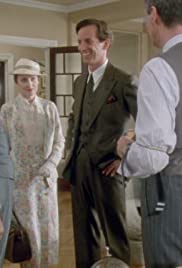
WASPS' NEST
UK, 1991 minutes, Colour.
David Suchet, Hugh Fraser, Philip Jackson, Pauline Moran, Martin Turner, Melanie Jessop, Peter Capaldi
Directed by Brian Farnham.
This is a short story, an early film from the 70-series for television of Agatha Christie stories with David Suchet as Poirot.
This is a rather mild a story. It is not so much a story of a murder but as the prevention of a murder. It involves a friend of Poirot, his relationship with his fiancee and her relationship with a past lover. The friend has a property and is trying to destroy a wasps’ nest in a tree, inviting his associate to remove the nest. This involves strychnine, the possibility of a murder, the potential for suicide. Poirot is able to talk with his friend, who has a terminal illness, and persuade him that he is not a killer.
1. The popularity of Agatha Christie mysteries? The television series with David Suchet as Poirot?
2. A short story, a seeming murder scenario, a different angle on murder and intentions?
3. The country house and the grounds, the tree and the wasps? The local fair, clowns, children…? The world of fashion, modelling?
4. Poirot and Hastings, the long friendship, Hastings and his new camera, clicking everything, Molly Dean, development of the photos, the bathroom…? Accompanying Poirot in the investigations?
5. Inspector Japp, chief inspector, his illness, collapse, hospital?
6. Poirot and his friendship with John Harrison, Harrison and his classical studies, his writings? His relationship with Molly? The friendship with Claude? At the fair? The revelation that Molly was Claude’s girlfriend? The news of Molly’s car breakdown? His wanting Claude to get rid of the wasps? The encounter with this lemon? The information about his terminal illness? The doctor? Poirot’s inquiries?
7. Claude, playing the clown, artist, getting rid of the wasps? Bringing the poison? The break with Molly? The continued relationship, the deception?
8. Molly, the model, the world fashion, the fashion show, relationship with John, deceiving him, the car crash, the relationship with Claude? Her illness?
9. Poirot, confronting John, his terminal illness, his attitude towards Molly and Claude, revenge, yet his planning to take the poison? Poirot saving him from being a murderer?
Published in Movie Reviews
Published in
Movie Reviews
Saturday, 09 October 2021 13:01
Agatha Christie's Poirot Million Dollar Bond Robbery
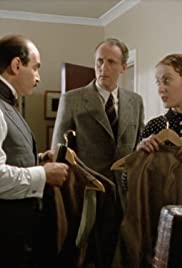
THE MILLION DOLLAR BOND ROBBERY
UK, 1991, 50 minutes, Colour.
David Suchet, Hugh Fraser, Pauline Moran, David Quilter, Ewan Hopper, Lizzie Mc Inerney, Oliver Parker.
Directed by Andrew Grieve.
This is an early short story amongst the 70 television versions of havoc Agatha Christie’s mysteries featuring David Suchet as Poirot.
It is set in the world of international finance and includes a trip on the Queen Mary on her inaugural voyage to New York – and features some footage from the actual voyage.
Hugh Fraser is captain Hastings would love a trip on the Queen Mary, Poirot not wanting to sail on water again. When Poirot is asked to accompany the area of bonds from London to the US, he accepts and enjoys the trip, Hastings have been some time of being seasick!
The original carrier is knocked down by a car in the street and suffers some poisoning. His successor is an ambiguous character, a gambler.
The bonds are stolen much to the anger of the security officer, and the head of the bank is imprisoned. Also in the complication is a glamorous blonde from the American South who intrigues Hastings. The solution is certainly not what was expected, a collaboration in stealing the bonds and putting the blame on the other character as a scapegoat.
1. The popularity of Agatha Christie stories? The series with David Suchet, embodying Poirot?
2. A short story, early in the series? The 1935 setting? The newsreel footage about the Queen Mary and her voyage to the United States? Financial issues, between the UK and the US, bonds? Literal transfer by ship?
3. Poirot, his friendship with Hastings, Hastings and the Queen Mary, Poirot not wanting to travel, his taking the job, the voyage, Poirot enjoying it, Hastings sick? The seeming failure of the mission, the disappearance of the bonds?
4. The bank background, Mr Shaw at the bank? Taking the bonds? His superior? Ridgeway as his alternative? The car accident? Shaw and the poisoning, taking to his bed? Nurse Long? Ridgeway, his seeming unreliability, his gambling, the thugs, his girlfriend is the Sec, talking with Poirot, concerned about him?
5. The voyage, Ridgeway and his gambling? Miranda Brooks and her American style? Hastings attraction? The disappearance of the bonds? The concern of the captain and the person? The news in England, Mc Neil and security, his antagonism towards Ridgeway and Poirot?
6. The return, Poirot urging Ridgeway away (later so that he would avoid the thugs)? His fiancee at the wharf, her concern? Mc Neil and his upset? The arrest of the bank superior, in jail?
7. Poirot, his visit to Shaw, the explanations, the revelation about Ms Brooks and Nurse Along? The plan with Shaw? The wrists – and a happy ending in good resolutions for Ridgeway and his fiancee?
Published in Movie Reviews
Published in
Movie Reviews
Saturday, 09 October 2021 13:01
Agatha Christie's Poirot Dumb Witness
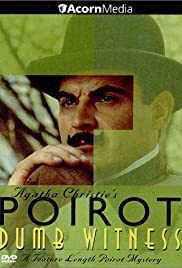
DUMB WITNESS
UK, 1996, 103 minutes, Colour.
David Suchet, Hugh Fraser, Ann Morrish, Patrick Ryecart, Kate Buffery, Paul Hertzberg, Julia St John, Norma West, Pauline Jemeson, Muriel Pavlow.
Directed by Edward Bennett.
The title refers to Bob, the dog at the mansion where murders take place. Bob is present at the opening where there is an attempted murder, is present with most of the characters, seems attracted to Poirot himself who has to make a decision at the end of the film as to where bold can spend the rest of his life.
This is one of the 70 films in the collection of television versions of Agatha Christie mysteries featuring David Suchet as Poirot.
The occasion for Poirot to be in the country is that he is accompanying Captain Hastings to an attempt at the speed on water record. The central character, the target of murder, is an elderly aunt – with the suspects being a niece, and their view, a niece who has married a Greek doctor. There are also other members of the household – and two elderly sisters, one of whom claims to be a medium and who is supported by the other (veteran actress Muriel Pavlow).
The murderer is an unexpected character who seems to be on side but reveals very unpleasant attitudes during the solution of the mystery.
1. Title? The focus on Bobby, the dog? Audience response to him? His presence at all the events? Communication with Poirot? The surprise of Poirot bonding with the dog?
2. The popularity of Agatha Christie’s mysteries? The series with David Suchet? Embodying Poirot and his character, mannerisms?
3. The speed test, Hastings friendship with Charles, Poirot accompanying? Meeting all the family? The excitement? The test, the failure of the boat, the explosion, Charles surviving? Dependence on his aunt for Finance? The dis-inheriting? His angers? Further tests? Going to the United States?
4. The tension in the opening, the dog on the landing, and Amelia, the reflection of the dressing gown initials? The tripwire, her falling down the stairs? Surviving? Her manner, her wealth, the relationships, spouses? Dr Granger? The two sisters and their sense of the cult? The range of different characters, interactions, the issue of the will, the change in the will, reactions after the death?
5. The two sisters, the seances, the green breath from the aunt? Their wanting to hold a late assignments seances, messages for Poirot? His using the seances for their taking Bobby into their care?
6. Bella, marrying Jacob, his Greek background, doctor, medication, suspicions? The children? The marks on the boys back? Bella accusing Jacob, leaving him? Her motivations, self-centredness, not wanting to go back to Greece? The murders? The aunt, the doctor and his diagnosis?
7. Poirot, his interventions, with the aunt, discussions about the will? His interrogations? Wilhelmina inheriting everything? Her relationship with the doctor? The threats, the raid on her house by Teresa and Charles? Her dividing the money between the relatives?
8. The issues of medication, tablets, liver illness, Jacob and his Greek solutions?
9. Satisfactory portrayal of the crime, the suspects, interactions, the mystery solved?
Published in Movie Reviews
Published in
Movie Reviews
Saturday, 09 October 2021 13:01
London Fields
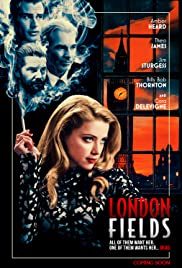
LONDON FIELDS
UK, 2018, 118 minutes, Colour.
Amber Heard, Billy Bob Thornton, Jim Sturgess, Theo James, Jason Isaacs, Caro to Lavinia, Gemma Chan, Lily Cole.
Directed by Matthew Cullen.
London Fields, based on a novel by Martin Amis who co-wrote the screenplay with Roberta Hanley, is curious and bizarre. It did not get wide release – and many potential audiences may not persevere with it.
In fact, the film was made in 2013 but delayed for a number of years in release. The film was recut by the producers (and around 30 of them are named in the credits). Eventually, there were two releases, the producers’ cut and, to a limited extent, the longer director’s cut.
In fairness to the director, he shared more of Martin Amis’s cosmic vision for this bizarre story, including footage of the cosmic, potential disasters, nature upheavals. These gave a tone to the telling of the story. While there are some traces of this in the producers’ cut, they seem more bewildering than indicating themes. Some of the action was also cut and the character, played by Johnny Depp, was introduced much earlier than intended by the director.
The setting is London, vistas of the city, a range of locations, mainly apartments and sidestreets, but also some parks – and the gala featuring of a national darts’ competition.
Amber Heard plays a clairvoyant who knows that she will be killed but not by whom. Billy Bob Thornton portrays a writer coming from the United States for an exchange with another author, Jason Isaacs, for staying in their homes. He encounters the clairvoyant and is attracted to her, spies on her in the above apartment, plans to write a book about her. There are many sequences of his writing and the text on his computer.
She is a highly ambiguous character, played for sexiness and intrigue. (Amber Heard was nominated for a Razzie for her performance – but Jim Sturgess, surprisingly and hugely overacting, should have been nominated – and won.) She encounters two men, observed by the writer, who are quite opposites. Jim Sturgess, unashamedly mugging, is tough, a gambler, an expert darts player, married with a daughter, who gets entangled with the clairvoyant. Theo James, on the other hand, is a respectable businessman who also gets entangled, her making an appeal to him for finance for a friend in need. He is also married – but succumbs to her.
In her manner, conversation, dress and undress, she responds to each of the men in different ways, adapting to their characters and lifestyles.
And, there are lots of conversations. But also with the ominous vision of the car, the dark street, her impending death.
Amber Heard and Johnny Depp were a couple of the time, later acrimoniously separating, and Johnny Depp does one of his highly eccentric performances, tough and money demanding.
So, a strange amount of interactions, which may be of interest or not, leading to the downfall of each of the men. And, as might have been anticipated, it is the writer who is to be her killer.
And, there is continuous irony with Jason Isaacs as the writer who went in exchange to New York, keeps in touch with the American writer, finally arrives back to find the clairvoyant dead, the American writer with a terminal disease having taken tablets, lying beside her. He has his manuscript – taken by the novelist who is seen then claiming authorship and reading excerpts on television.
It is clearly one of those films which audiences may make of it what they will and what they can.
Published in Movie Reviews
Published in
Movie Reviews
Saturday, 09 October 2021 13:01
Evil Dead II
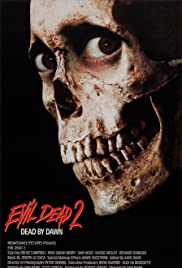
EVIL DEAD II
US, 1987, 84 minutes, Colour.
Bruce Campbell, Sarah Berry, Dan Hicks, Ted Raimi, Denise Baxter, Lou Hancock.
Directed by Sam Raimi.
Evil Dead was a cult horror success in the early 1980s, bringing director, Sam Raimi, to some kind of prominance – and a very successful career both in dramas and thrillers and Spiderman films. It also brought actor Bruce Campbell into some prominence.
The plot was a concoction of ancient books, curses and spells, and the raising of the evil dead to life. It capitalised on horror genre conventions rather than a development of plot and characters. It was so successful that this sequel was also concocted.
It is the same formula, an explanation of the Necrocomicon, a scholar investigating it, translating its curses and speaking them on to a tape recorder with dire consequences for himself and his wife.
Ash, Bruce Campbell, and his girlfriend travel to a remote village while the owners are absent – and listens to the tape recorder, again with dire results, especially for the death and decapitation of his girlfriend (and some grim comedy with her reappearance, headless). The Professor’s daughter and her boyfriend are coming to meet her family with further research but have to take a detour and get the help of another couple on the way.
This leads to the rising of the evil dead who have already tormented Ash in most gruesome ways. The newcomers are suspicious and push Ash down into the basement where he encounters the evil dead spirit of the professor’s wife.
The rest of the film is an expansion of the evil dead and there are attacks, a number of deaths, ghoulish presences, with Ash finally hurtling through time and space into the Middle Ages where he helps some knights who acclaim him as their leader.
In retrospect, the special effects are very small-budget, plot reliance on concoctions rather than any causal development. And, at times, the action is so absurd and the performances so basic. It takes its place in the development of this kind of horror which developed much more sophisticatedly in the 21st-century.
Published in Movie Reviews
Published in
Movie Reviews
Saturday, 09 October 2021 13:01
Agatha Christie's Poirot Mystery of the Spanish Chest
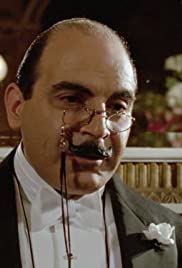
THE MYSTERY OF THE SPANISH CHEST
UK, 1991, 50 minutes, Colour.
David Suchet, Hugh Fraser, Philip Jackson, John Mc Enery, Caroline Langrishe, Pip Torrens, Malcolm Sinclair, Peter Copley.
Directed by Andrew Grieve.
This is one of the earliest films in the television series from Agatha Christie’s stories featuring Poirot. It is not one of the striking murder mysteries because of the murderer looks and acts suspiciously right from the beginning.
However, the mystery is in how he did it rather than that he did it.
The film opens with a fencing duel which is relevant to the characters and is repeated in the culmination of the story.
Poirot is seen at the Opera, is approached by a friend from the past, is persuaded to go to a party to meet the husband of an attractive young woman who seems to be flirting with another man. At the party, in the corner, there is a Spanish chest – and, later blood is seen to seep from it.
The woman is suspect but the man with whom she is involved is arrested for murder. For the culmination, Poirot is invited to the exclusive club and its gym where the murderer confronts Poirot with his rapier – but has to fight the accused man. And the film ends romantically. Veteran actor, John Mc Enery, is the scarred, supercilious racist villain.
1. The popularity of Agatha Christie’s mysteries? The television series with David Suchet?
2. The short story, one of the earliest of the television series? The presence of Hastings accompanying Poirot? The presence of chief Inspector Japp?
3. The prologue, the duel, and the fencing, the wound? Black-and-white? The later reprise of this sequence?
4. Poirot at the Opera, Lady Chatterton and her approach, the appointment, her flattery? Hastings and his criticism of Poirot’s vanity – and the final comment of Poirot claiming luck, and that he would be the best at humbility?
5. The introduction to Edward Clayton, tense, his work, the relationship with his wife, the clash with Major Rich, at the club, the discussions with Curtis, at home, the trip to Edinburgh, visiting Major Rich? His disappearance?
6. The party, Lady Chatterton, Edward Clayton not present? Poirot, the talk, dancing the Charleston? The next morning, Inspector Japp interrogating Poirot as a witness?
7. The Spanish chest, the blood seeping? Poirot and Hastings visiting, the empty chest, cleaned, the remains of the drilled hole, examining the contents of Clayton’s pocket, the screwdriver?
8. Marguerite, her relationship with her husband, with Major Rich after the death of his wife, nothing improper? Curtiss and his discussions with Rich?
9. The chief Inspector and his theories? Poirot and Marguerite? Her public arrest?
10. The set-up, Rich and his guilt, the butler and his testimony, the macabre aspects of the party with Clayton dead in the chest?
11. Curtiss, his arrogant racial superiority, the scar, his participation in the duel? Relationship with Clayton, with Rich?
12. His summoning Poirot to the club, the gymnasium, with his rapier? The explanation of his plot, Clayton as victim, the cruel death? The threat to Poirot? Rich, arrival, the fencing duel?
13. The happy ending, Rich and Marguerite, united? Poirot humble?
Published in Movie Reviews
Published in
Movie Reviews
Saturday, 09 October 2021 13:01
Agatha Christie's Poirot Hercule Poirot's Christmas
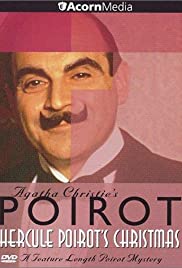
HERCULE POIROT'S CHRISTMAS
UK, 1994, 103 minutes, Colour.
David Suchet, Philip Jackson, Vernon.Dobcheff, Simon Roberts, Brian Gaspari, Sasha Bihar, Mark Tandy, Olga Lowe.
Directed by Edward Bennett.
The setting is attractive in itself, but it does not relate in any substantial way to the plot and its development.
There is a rather lengthy prologue in South Africa, two diamond miners in 1896, one greedy and vengeful, killing the other, being rescued in the desert by a woman whom he exploits.
The setting moves to 40 years on, the miner now a crotchety old man in a wheelchair, disliked by his family, with an exploitative reputation. However, he invites Poirot to spend Christmas with him to be on the alert (and Poirot, whose heating system has collapsed and can’t be fixed until after Christmas, accepts!).
The old man is killed, in a room locked from the inside. His three sons are the main suspects along with a granddaughter who has come from Spain. There is also a suspicious worker in the house.
When Poirot explains the solution to the gathered group, he gives a plausible hypothesis for each of them to be guilty. Also present is the local police superintendent – with quite a complicated solution concerning him and the woman from South Africa who has come to England. A rather ingenious plot.
Character actor, Vernon Dobcheff, is very effective as the unlikeable victim.
1. The title, the Christmas setting – not immediately relevant to the plot? But a pleasant setting for the murders?
2. The popularity of Agatha Christie’s mysteries? The television series with David Suchet?
3. The prologue, diamond mining in South Africa, 1896, Simeon Lee and his partner, greed, the murder, wounded, through the desert, Stella finding him, helping him recuperate, her not being married, birthmark, the sexual encounter, his abandoning her?
4. 40 years later, Simeon Lee, old, wheelchair-bound, angry, his family disliking him, the uncut diamonds and his safe, his phoning Poirot, inviting him to his house for Christmas? His fears?
5. Poirot, the heater not working, accepting the invitation, travel, listening to Harry and Pilar and their comments, arriving at the house, the house guest, the reaction of the family, settling in?
6. Harry and Pilar, meeting on the train, nephew and niece? Harry the bad sheep returning? William and Magdalene, their presence, dependence on the father, petulant manner? Alfred and Lydia, living in the house, dependent? The range of the staff, Tresilian and his years of service, Horbury and his suspicious behaviour, the maids?
7. Simeon summoning the family, the changing of his will? The visit of Inspector Sugden, the charity appeal, his return? Investigating the case? Collaborating with Poirot? Poirot visiting Chief Inspector Japp? Hs listening to his in-laws singing, his escape, investigating the case?
8. The dinner, the arguments, after dinner, William and his phone call, Magdalene and her phone call, Lydia going to the door? The sounds from the room? Simeon’s death, bashing the door down, the remnants of the balloon?
9. The investigations, Poirot and the Christmas gifts, the novelty store? Having tea with Magdalene, the secrets?
10. Pilar, the attempt on her life?
11. The characters of each of the family, Harry and his carefree attitude, absences? William, Parliament, marrying a young woman, perpetually indignant? Alfred, quiet, Lydia nice person, the miniature gardens – but the diamonds in the garden?
12. The complexities of the investigation, Sugden and his work, the Chief Inspector and his theories?
13. The older Stella, her presence in the town, seen at the hotel?
14. Poirot, assembling the group, the various hypotheses that they could all be guilty, William and the phone calls, Magdalene and her call, Alfred and the possibility of discussing with William, Lydia and her presence? Harry and Pilar? The revelation that Pilar was an impersonator?
15. The explanation of how the crime was done, the setting up of the ropes, the balloon novelty and its sound? The perpetrator leaving, returning, pulling the ropes?
16. The portrait of Simeon Lee? His being murdered by a blood relative? The revelation that Sugden was Stella’s son? His killing his father? The meeting with his mother? Her vengeance?
17. Not exactly a Christmas story but an ingenious plot?
Published in Movie Reviews
Published in
Movie Reviews
Saturday, 09 October 2021 13:01
Legacy of the Bones, The/ Legado de los Huesos
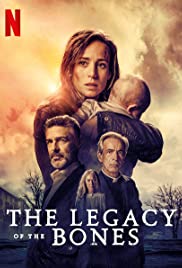
THE LEGACY OF THE BONES/ LEGADO DE LOS HUESOS
Spain, 2019, 121 minutes, Colour.
Marta Etura, Nene, Leonardo Sbaraglia, Francesc Orella, Imanol Arias, Benn Northover.
Directed by Fernando Gonzalez Molina.
The Legacy of the Bones is the second in a trilogy of mysteries, police work and detection. They are all set in Basque country – with a background of some Spanish superstitions as well as Spanish Catholicism – there is also the story of the detective herself, her growing up, her dominant mother and madness, her relationship with her sisters, her leaving the town, going to work with the FBI, her contact with an agent in the US who gives her advice.
She is also in relationship with an artist and in this film is pregnant and gives birth. However, there are demands on her because of her work, pressures on her partner, but her wanting to be a devoted mother.
There is a madness associated with the series of murders but they are to be seen in the context of a prologue from the 16th century when newly born daughters were offered in sacrifice.
There is also the Catholic dimension, this time with a psychologist who works in the local hospital and is an eminent member of Opus Dei. However, the focus again is on the detective’s mother, her madness, and her involvement with the series of women’s deaths.
It builds up to a dramatic climax between mother and daughter – the mother escaping, presumably to be involved in the third film in the trilogy.
1. Spanish detective story? Police procedure? Serial killer? Religious background?
2. The film was a sequel, the second in a trilogy? The focus on Amaia, her personal life, her career, the police, detection, solving mysteries?
3. The Basque setting, the town, homes and streets, the flooding, the river and the weir? The church? Homes and interiors? The countryside, huts, caves? The musical score?
4. Audience familiarity with Amaia? The original film, the background of her unhappy life in the town, leaving, the dominance of her mother, her relationship with her sisters, going to the United States, working with the FBI, the continued contact with the agent and his advice? Her relationship with James? The solution of the first case? Her working with the authorities, Jonan as her assistant?
5. Her personal life in the sequel, pregnant, giving birth? The relationship with James? Her returning to duty? The new case? The demands on her time, presence and absence, attending of the baby, the pressures on James? On her aunt? Her relationship with her sister? The older sister and her bakery, her book? Coming at the end? The significance of her dominant mother?
6. The opening, the 16th century, the birth of the child, the sacrifice of the daughter, the role of the authorities? The continuing tradition?
7. The range of deaths, the mutilations, the bodies, the caves? The background stories? The husbands? Internment?
8. The men in prison, the interrogations, the mysterious name and its continued presence in each case, Tartilla?
9. The psychological background? The therapists? The doctors? The treatment of the prisoners? The revelation of the doctor, young, his expertise, working with the mother? The linking of Tartilla with the mother? Memories of the previous case, her diet influence, the moral judgements?
10. The role of the church, Opus Dei? The priest? His manner, the link with Rome? With the Bishop? His work in the hospital? Severe manner, his Catholic atmosphere? Audience suspicions? Amaia and her challenging him, working with him? The truth about him? The suspicions with the younger doctor, his background, his father the gardener and separation?
11. The aunt, having brought up Amaia, her constant care, looking after the baby? The flood? Her being attacked? The baby taken? The sister and her husband coming to rescue her?
12. The portrait of the mother, her madness? Escaping from the hospital? With the doctor? Amaia going in pursuit? The cave, the ritual? The discovery that the child was a boy? Breaking the tradition? Amaia confronting the doctor, the gun, her mother? Her mother’s escape?
13. The resolution of the mystery? Further details of Amaia’s life? And the anticipation of the third film in the trilogy?
Published in Movie Reviews
Published in
Movie Reviews
Saturday, 09 October 2021 13:01
Agatha Christie's Poirot Dead Man's Folly
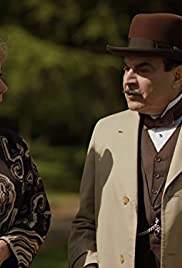
DEAD MAN’S FOLLY
UK, 2013, 89 minutes, Colour.
David Suchet, Sean Pertwee, Chris Gordon, Richard Dixon, Sinead Cusack, Rebecca Front, Zoe Wanamaker, Stephanie Leonidas, James Anderson, Elliot Barnes- Worrell, Ella Geraghty, Sam Kelly, Martin Jarvis, Rosalind Ayres.
Directed by Tom Vaughan.
Dead Man’s Folly is one of the six films with Peter Ustinov as Poirot, released in 1985.
This version is one of the very last in the television series, 70 films, of Agatha Christie Poirot mysteries featuring David Suchet.
As in some of the other episodes, the partner in investigation is the novelist, Ariadne Oliver, played by Zoe Wanamaker. Here she is devising a murder hunt for a fair but is suspicious and invites Poirot to Devon – and the film was shot in Agatha Christie’s own home, later owned by the National Trust.
The actual murder occurs later in the film and the unanticipated victim is a 14-year-old Girl Scout. However, there are numerous suspects, a great number of unanticipated complications, two more murders, including the father of the girl – with, of course, Poirot explaining everything. At the centre of the events is Sean Pertwee as the man who has just bought the mansion and Sinead Cusack as the widow of the former owner allowed to live on in a small house on the property.
There are both heavily involved in the mystery.
1. The title? Architecture and design? The actual folly and its role in the plot?
2. The popularity of Agatha Christie mysteries? This film as one of the last in the television series with David Suchet?
3. The Devonshire setting, the mansion and grounds, the countryside? Exteriors and interiors? The atmosphere of the fair, the entertainment and attractions, the mystery hunt? The boat shed? The scenes by the river? The musical score?
4. The reappearance of Ariadne Oliver? As author? Invited to invent the hunt? Her suspicions, inviting Poirot to Devonshire? The relationship between the two, murders, clues, solutions? The explanation of the situation, the hunt, various people changing clues and victims?
5. The house, Sir George Stubbs, his rough style, his wife, childlike, simple, hypochondriac? His buying a house? Its history? Mrs Folliat and her history, the ownership of the house, her being allowed to stay in the small home?
6. The various others at the fair, the architect and his flirtations, business associates, political connections?
7. Meals, discussions, Poirot and his observations? The mysterious behaviour of Hattie? And her disappearances?
8. Hitchhikers, getting the lift with Poirot, the conversations, the reappearance? And the irony of the hitchhikers and the disguise for Hattie?
9. Poirot and his conversations with Mrs Folliat, the explanation of the history of the family? Her concealing the truths? The final interview and her admitting the truth?
10. The hunt, the various clues, participants, the fortuneteller and Poirot discussing with her? The local girl, the Girl Scouts, the walk returns and introducing her? The secretary and her suspicious behaviour? The irony that the murder victim was the young girl?
11. Poirot, his discussions with the boatman, the ironic remarks, his being the father of the dead girl, his own death, attributed to drink?
12. Poirot unravelling the mystery? The revelation about George Stubbs, his being the wayward son, his return, buying the family house, enabling his mother to stay? His marriage to Hattie, the complications of his relationships? The murder of his wife? The arrival of the cousin? Hattie’s disappearance? The backpackers and Hattie’s disguise and cover? The cousin, mysterious visitor, arriving, under suspicion? Prison?
13. Poirot, with Mrs Oliver, the explanation of the complexities, the arrest of Sir George Stubbs? His mother willing to face justice?
Published in Movie Reviews
Published in
Movie Reviews
Saturday, 09 October 2021 13:01
Agatha Christie's Poirot One, Two, Buckle my Shoe

ONE, TWO, BUCKLE MY SHOE
UK, 1992, 103 minutes, Colour.
David Suchet, Philip Jackson, Joanna Phillips- Lane, Peter Blythe, Carolyn Colquhoun, Christopher Eccleston, Karen Gledhill, Laurence Harrington, Rosalind Knight, Sarah Stewart, Helen Horton.
Directed by Edward Bennett.
This is one of the earlier television versions of Poirot’s solving of murder mysteries, with Agatha Christie’s ingenuity and David Suchet embodying Poirot.
The setting is visits to the dentist – who, it seems, kills himself soon after Poirot’s appointment. However, there were a number of other appointments and some manipulation of the timeframe of the alleged suicide.
Chief Inspector Japp works with Poirot on the case, especially in an encounter with a former actress now involved in charity work but returning from India. Not only does the dentist die but this woman also disappears – and the body of another dead woman is discovered.
The main suspect, played by Christopher Eccleston who in 12 years time was to be Doctor Who, arrested, a surly man, but loved by the assistant to the dentist. As always, there are quite a number of complications, a prologue in India becoming important, the central character, a financier, involved with American relations, a dead wife, an assistant who turns out to be the solution to the mystery.
1. The title? The nursery rhyme? The motif of the girls playing it on the footpath?
2. The popularity of Agatha Christie’s mysteries? The television series with David Suchet?
3. The London setting, the atmosphere of the 1930s, costumes and decor? Banking? Dentistry? The musical score?
4. The prologue in India, Much Ado, the performance, Blunt and Gerda, the friendship with Mabelle, the announcement of the engagement? Marriage? The shift to 12 years later? (And the footage of the visit of the Prince of Wales to India and the atmosphere of British Empire?)
5. The focus on the dentist? Poirot and his teeth, visits? Friendship with Mr Morley? The other patients? Blunt? Mabelle? Amberiotis? The presence of Frank Carter? The timeframe for the visits? The death of the dentist? The decision about suicide? Mr Morley as a cheerful dentist? The interviews with his sister?
6. Gladys, her being away for the day, the false message? Her relationship with Frank? His being out of work, recruited as a fascist, working as a gardener? His arrest? In prison? His angers? The discussions with Poirot, Poirot his only hope?
7. Mabelle and her story, acting, charity work, returning to England, wanting to see Gerda? The discussions with Amberiotis? Her cheering as with Poirot and the Chief Inspector? Her disappearance? The visit to the house? The dead woman? The false name and address and the married couple?
8. Blunt, his in-laws, very American, the haughtiness of the sister-in-law? Looking down on Poirot? The issues of money and support?
9. Poirot going to the mansion, Blunt and his wealth, his secretary? The story of his wife, her illness and death? The portrait in his office?
10. Frank Carter working as a gardener, his cover, the attempt on Blunt’s life, his assistant overcoming Carter, Carter’s arrest?
11. Poirot, with the chief inspector? The interrogations? The mystery of Mabelle? Finding the alternate body? The issue of stockings, the visit to the room, the body and the buckle on the shoe? The buckle coming loose in the street?
12. The gathering everybody, the explanation of the case, the vindication of Frank Carter? The truth about the events and the time frame? The revelation that the secretary was Gerda, bigamy on the part of Blunt? The resolution?
Published in Movie Reviews
Published in
Movie Reviews